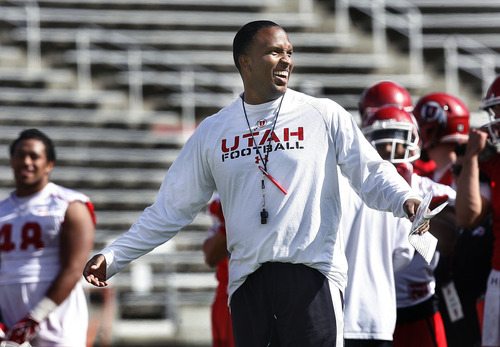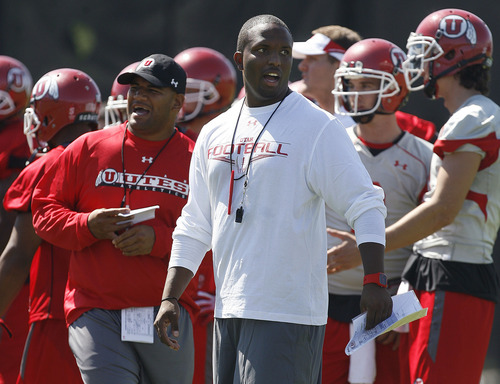This is an archived article that was published on sltrib.com in 2012, and information in the article may be outdated. It is provided only for personal research purposes and may not be reprinted.
Missing the irony, Utah coach Kyle Whittingham once explained a midseason shakeup of his offensive staff by saying the move was necessary in the interest of "more continuity and rhythm."
That's exactly what the Utes have lacked since former offensive coordinator Andy Ludwig departed and Brian Johnson stopped playing quarterback after the 2008 season. So now that this operation is in Johnson's hands as the coordinator, the bigger issue is what Whittingham wants his offense to look like.
If I'm unclear about the answer, that's forgivable, according to someone who should know.
"Production is the most important thing to him," Johnson said. "I don't think he has a strong opinion on how you produce. We've had multiple different systems here over the past eight years."
Whittingham contends his preferred scheme can be categorized. His label: "a modified spread," stemming from former coach Urban Meyer's offense.
In any case, Whittingham is known for being demanding of his staff and impatient with the offense. That's partly why when Johnson walks into the Rice-Eccles Stadium press box Aug. 30, he'll become Utah's fourth play-caller in 33 games.
The steadying solution? Give the keys to Johnson and let him drive this thing.
Johnson is creative, as illustrated by his plans for running back Harvey Langi — until Langi decided this summer to serve an LDS Church mission. The Utes intended to have Langi start alongside John White in a two-back scheme, functioning mainly as a receiver.
While his $2 million salary and responsibility as the program's CEO dictate a certain level of involvement, Whittingham needs to give his new coordinator control of the offense.
Regarding the staff changes, Whittingham believes there's "much more carryover than you would think, having gone through four coordinators." He cites no "major overhaul or radical departure" from the system Ludwig installed to launch the post-Meyer era — other than last October, when quarterback Jordan Wynn's injury left the Utes with no choice other than to play conservatively. They won four Pac-12 games as White became a 1,500-yard rusher, but scored 14 or fewer points in their five conference losses.
Countering an opponent's dynamic offense requires more than controlling the ball and playing field position. Just look at February's Super Bowl contestants. The Giants and Patriots ranked in the NFL's top five in passing yards, counter to the ingrained philosophies of coaches Tom Coughlin and Bill Belichick.
"The old idea that you can run the ball and play defense, that doesn't get it done," NFL Network analyst Brian Billick said.
The same applies to the Pac-12, where innovative offensive coaches Mike Leach of Washington State, Rich Rodriguez of Arizona and Todd Graham of Arizona State now work. To compete, the Utes need an offense that can perform at the level of their defense.
The Utes had such balance in 2008, when they went 13-0. Ludwig never was embraced by Utah fans, but his offense ranked 35th in the country that season, averaging 400 yards. Utah has not cracked the top 50 since he left.
Whittingham promoted Dave Schramm to offensive coordinator, then shifted the play-calling duties to Aaron Roderick in the eighth game of the 2009 season. In 2011, he demoted Roderick when Norm Chow became available.
This past winter, after Chow became Hawaii's coach, Whittingham promoted Johnson, who — to bring this carousel back to the start — was credited for much of Ludwig's success in '08 with his on-field management.
Johnson is at the controls now, from the coaching booth. Whittingham's challenge is to not micromanage him.
Twitter: @tribkurt





